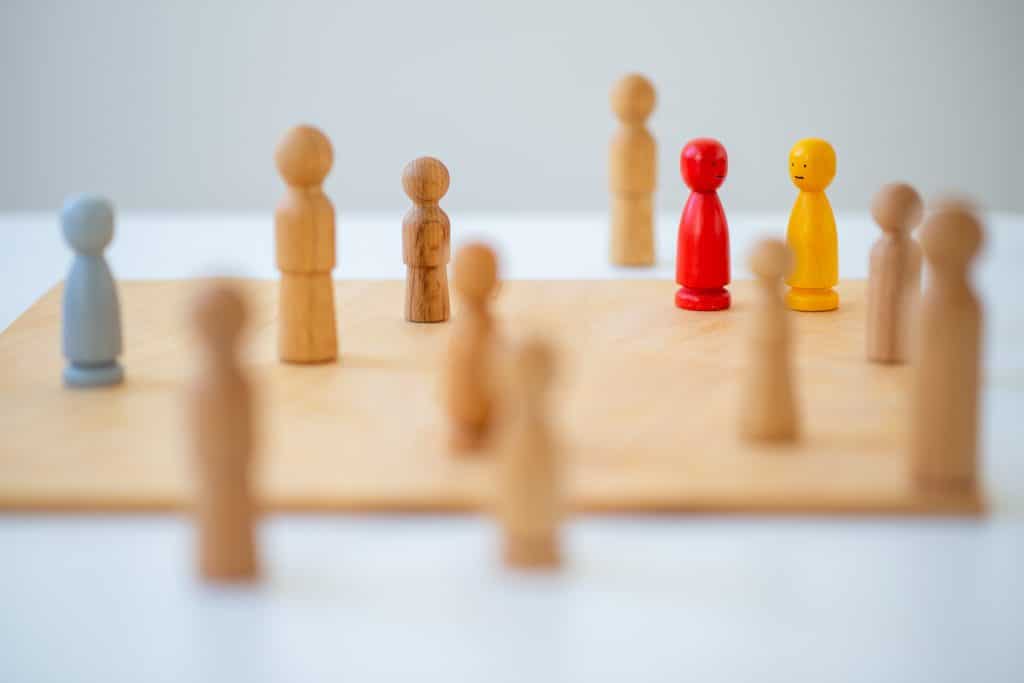Divorce is never easy, and the end of a marriage can bring about a range of challenges and difficulties. One of the less talked about issues that can arise after a divorce is the loss of a shared social network. When a couple splits up, it’s not just the end of the romantic relationship, but also the end of a shared social circle. This can have a significant impact on mental health and emotional well-being, leaving individuals feeling isolated and alone. In this article, we will explore the impact of losing a shared social network after divorce, and provide some managing methods for dealing with this challenging situation.
What is on this page
A shared social network can be incredibly important to our sense of belonging, and when it is lost, it can have a profound impact on our mental health and emotional well-being. Research has shown that social support is crucial for mental health, and individuals who lack social support are more likely to experience depression, anxiety, and other mental health issues.
When a couple separates, they may find that they are no longer invited to social events or gatherings that they once attended together. This can leave them feeling excluded and isolated and can lead to feelings of loneliness and depression. The loss of a shared social network can also make it difficult to find new friends, as many people tend to make friends through their social circle.
While losing a shared social network can be challenging, there are managing methods that can help individuals deal with this situation. Here are some ideas for dealing with the loss of a shared social network after divorce:
- Embrace new experiences and hobbies: Trying new things can be a great way to meet new people and make new friends. Consider taking up a new hobby or joining a club or organisation that interests you. This can help you meet like-minded individuals who share your interests.
- Reconnect with old friends and family members: It’s common for people to lose touch with friends and family members over time. After a divorce, it can be helpful to reach out to old friends and family members and reconnect. This can provide a sense of familiarity and comfort during a challenging time.
- Join support groups and/or therapy: Support groups and therapy can be incredibly helpful for individuals going through a divorce. These resources provide a safe space for individuals to talk about their experiences, share their feelings, and receive support and guidance from others who have been through similar situations.
- Use social media to maintain connections: Social media can be a great way to stay in touch with friends and family members, even if you are no longer able to see them in person. Consider using social media platforms to maintain connections with your social circle.

Building A New Social Network
While managing methods can help individuals deal with the loss of a shared social network, building a new social network is also important for long-term well-being. Here are some ideas for building a new social network after divorce:
- Find new friends through work or school: Work and school can be great places to meet new people and make new friends. Consider joining a club or organisation at work or school, or attending social events to meet new people.
- Join social groups or clubs: Joining a social group or club that interests you can be a great way to meet new people who share your interests. Consider joining a sports team, book club, or another social group in your community.
- Volunteering and community involvement: Volunteering and community involvement can be a great way to meet new people and give back to your community at the same time. Consider volunteering for a local charity or non-profit organisation, or getting involved in community events and activities.
The Anxiety Behind Building A New Social Network
Building a new social network after a divorce can be daunting, and it’s not uncommon for individuals to experience anxiety or fear around the process. Starting over can be challenging, and the thought of putting oneself out there and meeting new people can be overwhelming. Individuals may worry about being rejected or not fitting in, or they may feel uncomfortable in social situations. Additionally, building a new social network can take time, and individuals may worry that they will never find the same level of connection and support they had with their former social circle. However, it’s important to remember that building a new social network is a process, and it may take time to find the right people and build meaningful connections. With time, patience, and perseverance, individuals can overcome their anxiety and build a new social network that provides them with the support and connection they need to thrive.
How Therapy Can Help With Loss
Therapy can be a powerful tool for helping individuals cope with loss, including the loss of a shared social network after divorce. Therapists can provide a safe and supportive space for individuals to process their emotions, explore their thoughts and feelings, and develop managing methods Through therapy, individuals can gain a deeper understanding of their grief and loss, learn how to manage their emotions and find new ways to connect with others. Therapists may also provide guidance on building a new social network and making meaningful connections with others. By working with a therapist, individuals can find the support and guidance they need to navigate the difficult process of loss and come out stronger on the other side.
The rise of social media has been one of the defining features of the 21st century. From Facebook to Instagram to Twitter, billions of people have connected with each other, sharing their thoughts, experiences, and daily lives with one another. However, with the increasing amount of time, we spend on social media, we are also becoming more vulnerable to its negative effects. From anxiety and depression to social isolation, social media can take a toll on our mental health. But what happens when we lose access to social media altogether? How can we cope with the loss of this powerful tool that has become so central to our lives?
Integrative therapy, a holistic approach to psychotherapy that incorporates various therapeutic methods and modalities, can be a successful way to help individuals navigate the loss of social media. Through a combination of talk therapy, cognitive-behavioural therapy, mindfulness, and other methods, integrative therapy can help individuals identify the root causes of their reliance on social media, and develop managing methods to deal with the loss of this powerful tool.
One of the key benefits of integrative therapy is that it allows individuals to explore the deeper emotional issues that may be fueling their dependence on social media. For many people, social media serves as a way to escape from their problems or feel connected to others. By addressing these underlying emotional issues, individuals can begin to find healthier ways to cope with their feelings of loneliness, anxiety, and other negative emotions.
Another benefit of integrative therapy is that it helps individuals develop new skills and approaches for managing their emotions and behaviours. For example, cognitive-behavioural therapy can help individuals learn to identify and challenge negative thought patterns that may be contributing to their reliance on social media. Mindfulness methods can also be helpful, as they can help individuals learn to be more present and focused in the moment, rather than seeking distraction through social media.
In addition, to talk therapy and mindfulness methods, integrative therapy can also incorporate other modalities, such as art therapy, music therapy, and movement therapy. These modalities can provide individuals with alternative ways to express themselves and process their emotions, which can be especially helpful for those who may struggle to articulate their feelings verbally.
Overall, integrative therapy can be a powerful tool for individuals who are struggling to cope with the loss of social media. By providing a holistic approach to psychotherapy that incorporates various therapeutic methods and modalities, integrative therapy can help individuals develop the skills and methods they need to manage their emotions, cope with stress, and build healthy relationships with others. Whether you are struggling with the loss of social media or simply looking for ways to improve your mental health, integrative therapy can be a successful and soulful approach to healing.
Divorce can be a difficult and challenging time, and the loss of a shared social network can add to the stress and isolation that individuals may already be feeling. Managing methods such as embracing new experiences and hobbies, reconnecting with old friends and family members, joining support groups or therapy, and using social media to maintain connections can help individuals deal with the loss of a shared social network. Building a new social network is also important, and individuals can find new friends through work or school, join social groups or clubs, or get involved in volunteering and community involvement.
It’s important to remember that seeking help is not a sign of weakness, and individuals going through a divorce should not be afraid to reach out for support. Professional counselling, therapy, and support groups can provide valuable support and guidance during this challenging time.
Living with the loss of a shared social network after divorce can be challenging, but it’s important to remember that it’s possible to build a new social network and find support and connection in new ways. By taking steps to stay socially connected, individuals can improve their mental health and emotional well-being during this difficult time.

